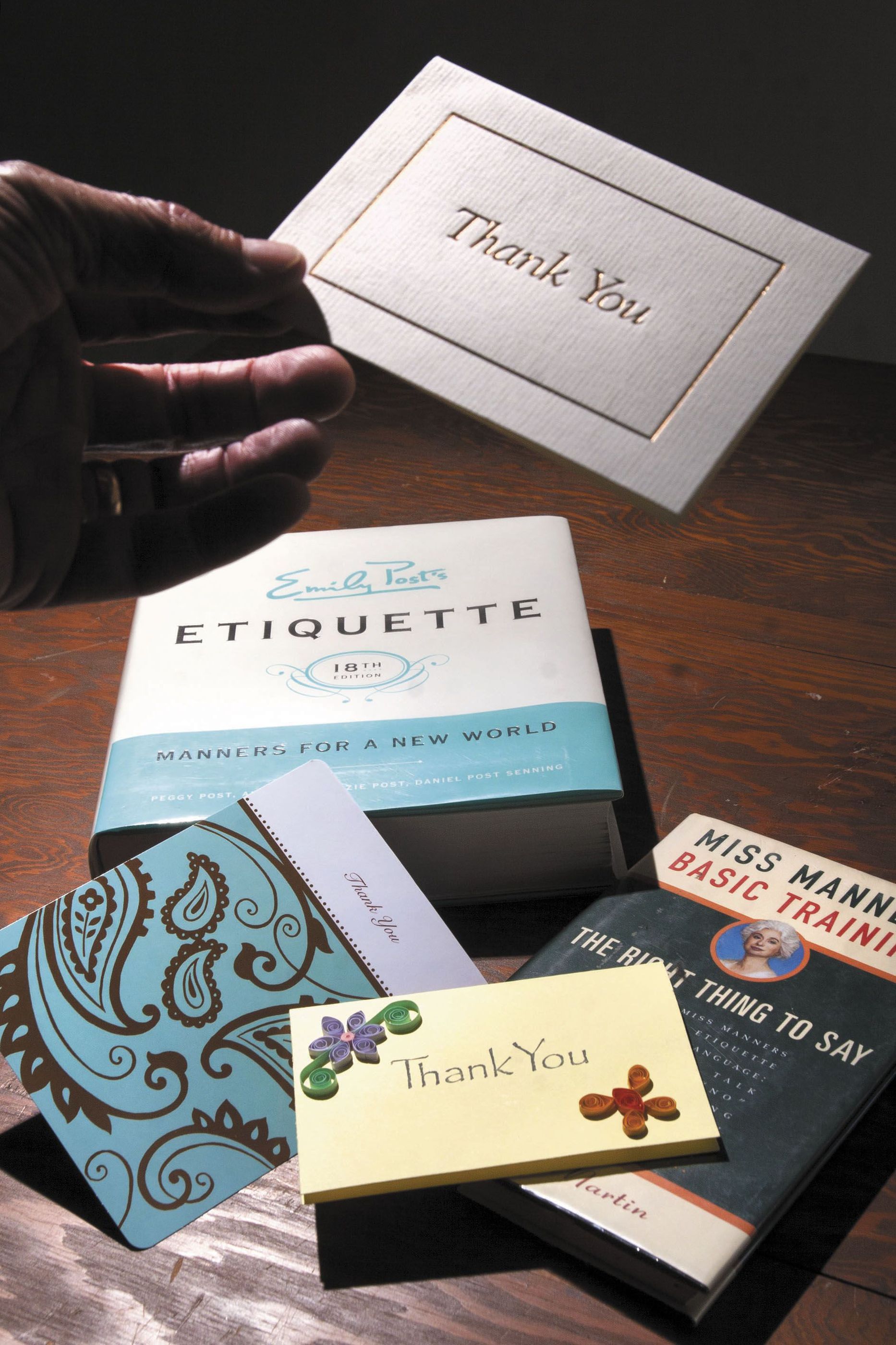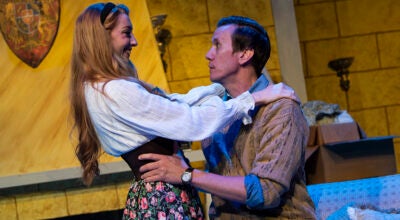Do manners still matter?
Published 12:00 am Friday, September 12, 2014
Are manners still important?
A friend of mine brought up this question recently. She was bemoaning the fact that, for several parties she helped host this summer, some guests never bothered to RSVP. At one occasion in particular, the cost was $40 per person.
“Why, that’s $400!” I said.
“Yes, I know that,” she said, the irritation still evident in her voice.
So I decided to do a little research.
Are manners still important?
Among all the folks I talked with, the answer is unequivocally yes.
“Yes, they are still important,” says Sue Dodd. For years, Sue, a retired educator, hosted a manners luncheon for the entire fifth grade at China Grove Elementary. Trust me, the lady knows her stuff when it comes to manners.
“Manners are very much needed and very much appreciated,” Sue says. “That’s what people notice. They don’t go out of style, ever.”
Sue does admit, however, that RSVPs have almost become a thing of the past. The remedy to that, she feels, is to send invitations for regrets only, and to include an email address to which people can respond.
When people do not RSVP, it puts the responsibility on the party giver, says Margaret Basinger, another retired educator. “Sometimes, you just have to call people.”
That’s what Margaret — always a take-charge woman — did when she and her husband, Dale, threw a 40th anniversary party this summer.
Margaret also loves to write and receive notes.
“This generation doesn’t have the privilege of having a treasured box of notes like you and I do,” she says.
But she knows she’ll always receive a handwritten note from her friend, Kaye Brown Hirst.
“She sends a card if you just breathe hard,” Margaret says. “It means so much to get a note. Which reminds me, I have one I simply need to get out today.”
As far as acknowledgements go, Sue says that writing a note or sending an email are both perfectly fine.
But, she says, “A handwritten note is a treasure. If you want to really impress somebody, do it in writing. But I like emails, too, because they’re real quick and you can respond right then.”
Paul Fisher knows a little something about note writing, and saying thank you. No matter what someone does for him, the F&M chairman says thank you.
“I’m just trying to show my appreciation for people’s contributions,” he says. “People don’t know how powerful the words ‘thank you’ are. To me, they’re the two most powerful words in the English language.”
He adds, “The ultimate thank-you is when somebody sits down, takes their time, and writes a thank-you note to show their appreciation.”
Paul says that to him, saying thank you is instinctive. “I would never not thank anybody.”
Over the years, he notes, he’s spent time in the hospital.
“The first opportunity I get when somebody does something for me, I say thank you,” he says. “When you are courteous and kind, people return the favor. Both sides benefit.”
Paul says that when he gets thank-you notes at the bank, he shares them with F&M’s 125 employees.
“It inspires our people to do an even better job,” he says. “When somebody takes time to make a call or write a letter, that’s a powerful motivation. If you don’t welcome your customers, you’re not gonna have any.”
He adds, “If I had any advice to give, I’d say never miss an opportunity to say thank you to somebody who has done something for you, whether, significant or insignificant. You’d be surprised how many happy faces you create with just those two words.”
Saying thank you is something that Bret and Sarah Busby endeavor to pass along to their three daughters, Emily, 11, Kathryn, 9, and Brooke, 5.
Sarah’s friend Meg Dees marvels at how quickly Sarah sends out thank-you notes.
“I want to show my gratitude to the person who took the time to select a gift for me,” Sarah says. “I want them to know how much I appreciate their generosity and kindness. It was part of my upbringing, something I learned from my grandmother.”
Sarah often writes notes while her girls are doing homework.
“Today, one of my daughter’s teachers gave her a milkshake,” Sarah says. “I asked Emily if she thanked her teacher and she said yes. Then, after a pause, she said she plans to write a note, too. Seems the tradition might continue into the next generation.
Meg writes notes personally and also professionally, in her role as vice president of development for Foundation for the Carolinas.
But, she admits, “I’m the worst at RSVPing. I am going to a baby shower tomorrow and I thought my mom would RSVP for me but she did not. I did call and tell them we were coming.”
Kaye, too, writes notes personally and professionally, in her role as executive director of Rowan Museum.
“A nonprofit agency is gonna thank people right away,” she says.
Just after her 60th birthday party, Kaye and husband Ed left on vacation. But she took along notes, addresses and stamps so that she could write thank-you notes while she relaxes.
Personally, Meg says, “I worry about handwritten notes. People don’t do it anymore.”
Rhodes and Krista Woolly are definitely not in that group of folks. Rhodes is senior pastor of St. John’s Lutheran Church, but still somehow manages to send out a voluminous amount of handwritten notes to parishioners and others. Krista, too, writes notes in her role as executive director of the Community Care Clinic.
Each spring, the clinic is the recipient of funds raised at the annual Fashions for a Cause. There were about 30 women on the project committee, and because Krista didn’t know exactly who did what, she wrote a note to each of them.
“People couldn’t believe it,” she says. “They were shocked.”
The couple’s three children learned about writing notes from a young age.
“When our kids were younger, we lived far away from family,” Krista says. “When we needed to write notes, I’d buy a card, and we’d sit down and we’d all sign it.”
Krista is proud of the fact that her oldest son, Carter, sent out dozens of handwritten notes to acknowledge high-school graduation gifts. It didn’t take too much prodding from her.
“He knew he needed to do it,” she says.
Manners are something Susan Kluttz tried to pass along as mayor of the city of Salisbury. She had the opportunity to spend time with all of the public schools’ third-graders when they came to her office as part of the walking tour of Downtown Salisbury.
“I consider manners part of a child’s education,” says Susan, now secretary for the N.C. Department of Cultural Resources.
Susan says she asked the children to do four things for her: stand up when she approached them, give her a firm handshake, make eye contact and introduce themselves using their full name.
“If those manners could help one child from being at a disadvantage later, I thought it was important,” Susan says. “And I thought it was important they hear it from someone other than their mom or teacher.”
Even with her current schedule, she says she still tries to write thank-you notes when she can.
“It means a lot to anybody to be thanked,” she says.
“The older I get, the more I see thank-you notes are important to let that person know how much their thoughtfulness has meant,” says Melissa Shue, the mother of three. “We live in a thoughtless time in some regards. Mark and I try to teach our children to respect others, to have humility and to say please and thank you.
“It’s the right thing to do.”
I was thrilled to attend a baby shower last weekend in Charlotte for the daughter of my dear friends.
Because I was thinking about this story, I couldn’t help but ask Christine later if she planned to write thank you notes. At the party, I noticed that she sincerely and profusely thanked each person who gave her a gift. But did think she that was enough?
“My mom would kill me if I didn’t!” Christine says. “In all seriousness, I write notes because I want people to know how much I appreciate the gift. I still like to receive notes in the mail so I think other people do, too.”
I’m guessing she’ll pass these good manners along to her baby, too.
Freelance writer Susan Shinn lives in Salisbury.




